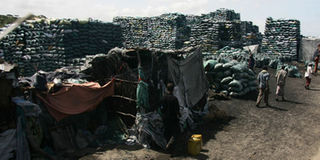Breaking News: Maai Mahiu tragedy: Death toll rises to 45
Kenyan forces in Somalia aiding enemy- UN

Traders sell charcoal in Kismayu in May. Illicit trade in charcoal facilitated by Kenyan troops in Kismayu, Somalia is producing significant revenues for the al-Shabaab, a team of United Nations monitors say in a report published on July 17, 2013. FILE
Illicit trade in charcoal facilitated by Kenyan troops in Kismayu, Somalia is producing significant revenues for the al-Shabaab, a team of United Nations monitors say in a report published on Wednesday.
Along with its local allies and in collaboration with al-Shabaab militants, the KDF has been exporting charcoal from the port of Kismayu for the past several months "in flagrant violation of the Security Council ban," the report says.
Kenyan forces' involvement in the charcoal trade began soon after the KDF drove Shabaab out of Kismayu last September, according to the UN experts.
Working in cooperation with Sheikh Ahmed Mohamed Islam “Madobe” and his Ras Kamboni militia, the KDF has helped export about one million sacks of charcoal per month, the report states.
"Al-Shabaab, its commercial partners and networks remain central to the business locally and internationally," the UN monitors find.
They estimate that the charcoal trade is bringing Shabaab even more than the $25 million a year it was making prior to the KDF takeover of Kismayu.
"Overall, the charcoal exports have increased by 140 per cent in comparison to previous years," the report states, reiterating that "the charcoal business architecture and trade networks remain intact, with al-Shabaab maintaining a central role and continuing to benefit significantly."
"Essentially, with the changeover of power in Kismayu, the shareholding of the charcoal trade at the port was divided into three between al-Shabaab, Ras Kamboni and Somali Kenyan businessmen cooperating with the KDF," the report adds.
Reject allegations
The Kenyan military has rejected the UN allegations.
If accurate, the monitors' study suggests that Kenyan troops are indirectly helping sustain Shabaab as a fighting force that in the past has killed Kenyan soldiers.
Despite serious setbacks inflicted by the KDF and the African Union military mission in Somalia (Amisom), a Shabaab force of about 5000 fighters remains "arguably intact in terms of operational readiness, chain of command, discipline and communication capabilities," the monitors say.
They add that KDF units in southern Somalia are continuing at times to operate independently of Amisom.
The Kenyan government and the African Union signed an agreement over a year ago stipulating that Kenyan troops would formally integrate into Amisom's command-and-control structures.
As of last February, however, the monitoring group "continued to receive corroborating reports indicating that the operational presence of KDF in Amisom was more theoretical than practical," the report says.
The monitors say they observed KDF personnel failing to wear the African Union/Amisom insignia of a troop-contributing country in Somalia.
In addition, the KDF has been carrying out "unauthorised air strikes in Somalia," the report alleges, citing aerial attacks on Jungal village last July.
Early this year, Colonel Cyrus Oguna, a spokesman for the Kenyan forces in Somalia, "confirmed that KDF had conducted more air strikes in the Gedo region," the report notes.
Utility helicopters
The UN Security Council has not approved an air component of Amisom other than a fleet of three attack helicopters and nine utility helicopters, the monitors point out.
"However," they add, "before and after integrating into Amisom, the government of Kenya has continued to deploy the Kenya Air Force in Somalia, potentially violating the arms embargo" imposed by the UN.
Relations between Kenya and Somalia's federal government have been roiled by a number of factors, including the KDF's and the Ras Kamboni militia's move to "unilaterally" begin exporting charcoal, the report says.
"The explicit instructions of President Hassan Sheikh to Amisom to keep the port of Kismayu closed and prevent the export of charcoal have been consistently flouted by KDF/Amisom," the monitors report.
In addition, the UN group says it "has established that the Sector 2 commander of KDF, Brigadier Anthony M. Ngere, and his subordinates in Kismayu, in combination with the Ras Kamboni militia, have routinely denied clearance for government of Somalia officials visiting Kismayu."
Tensions between Nairobi and Mogadishu could be further exacerbated by a dispute over maritime boundaries between the two countries, the report adds.
Demarcation of the respective areas of control has consequences for the extent to which Kenya and Somalia may benefit from offshore exploitation of oil and gas deposits.
The report includes an acknowledgment of Kenya's cooperation with the research conducted by the UN team.
"The Monitoring Group would like to express its sincerest gratitude to the government of Kenya for hosting its presence at the United Nations Office at Nairobi and facilitating its work and investigations," the report says.




